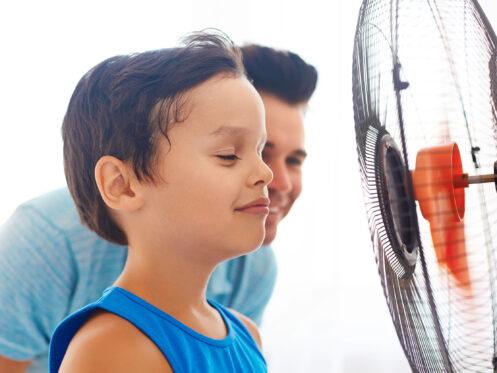Climate change is causing heat waves to occur more frequently, and they’re also intensifying in their severity. This situation poses serious risks to the health of those affected, as well as dangers to residential electrical systems. During extreme heat, there is often a surge in electricity use. That can strain the wiring in your home, overload the circuits, and even result in dangerous electrical outages or fires.
Whether you’re a landlord or a homeowner, you need to protect the electrical system of your property during a heat wave to ensure uninterrupted power and everyone’s safety. This guide provides practical steps to manage energy use wisely, safeguard your electrical infrastructure, and prepare your home for extreme heat stress.
Understand the Risks Heat Waves Pose to Electrical Systems
Before selecting specific solutions, it is essential to identify your system’s vulnerabilities. For heat waves, the particular issues might include overloaded circuits, degraded wiring, transformer overload, and power surges. If many appliances are running simultaneously, they may exceed the system’s capacity; a hardworking air conditioner increases this likelihood. Heat can also exacerbate pre-existing issues with damaged or older wiring, heightening the risk of electrical fires. Utility equipment outside your home, such as transformers, can overheat and cause a localized power outage.
Schedule an Electrical Inspection Before Summer Peaks
One of the most effective preventative measures you can take is scheduling an inspection with a licensed electrician. They can check for signs of undersized or outdated wiring, loose or corroded connections, circuit breaker performance, and the overall system capacity and load. If your home is more than 30 years old, a professional review of the electrical system is critical. It’s also crucial if you’ve recently added any power-hungry appliances but haven’t had an inspection performed in some time.
Upgrade Outdated Electrical Components
Older homes weren’t typically designed to handle the load that comes with modern smart devices, home offices, and air conditioners. Upgrades you should consider include the circuit breaker panel, wiring, and outlets. Update fuses and older breaker panels with contemporary equipment featuring surge protection.
Cloth-insulated wires and aluminum wiring can pose fire hazards. Still, modern copper wiring upgrades enhance efficiency and safety. Ground-fault circuit interrupters (GFCIs) prevent fires in areas prone to moisture, such as bathrooms and kitchens. Arc-fault circuit interrupter (AFCI) breakers serve the same purpose in living quarters.
Reduce Electrical Load During Peak Hours
The majority of local grids are most strained between 2 and 7 p.m. during a heat wave. Help both your home and the surrounding community by reducing electricity consumption during these times and making minor changes to minimize overload risks, thereby helping your home’s electrical system perform better under stress. Set the thermostats several degrees higher than usual; 78 degrees Fahrenheit is a good setting when anyone is at home. Avoid running major appliances during peak hours; the dishwasher or washing machine can wait until later. Enhance air circulation efficiency by utilizing ceiling fans. Turn chargers, electronics, and lights off when they’re not being used.
Install Surge Protectors
Heat waves can lead to power surges due to sudden outages or increased demand. Plug-in surge protector strips are useful for gaming consoles, TVs, and computers. You can also have an electrician install a whole-house surge protector at the primary electrical panel to safeguard your possessions and residence against a significant spike. Surge protection is an affordable investment when you compare it to the costs of replacing fried electronics and trying to recover lost data.
Maintain Your HVAC System
Your home’s air conditioner consumes a lot of electricity, especially during a heat wave. If it’s not operating efficiently, your electrical system will suffer extra strain. Conversely, a well-maintained system will draw less current, operate more efficiently, and keep the overall load more manageable when there’s extreme heat outside. Maintain your system by changing the filter every summer and cleaning the condenser coils regularly. Schedule a professional tune-up in the spring, and have a professional seal and insulate your ducts.
Invest in Smart Home Energy Management
Smart energy monitors and thermostats can help your household optimize electricity consumption. Remote control over your cooling schedules can help prevent energy waste when no one is home, but don’t forget about pets living with you. Set alerts you can respond to for usage spikes or abnormal system behavior in your home. Use insights into specific appliances that use more energy than others to balance load and demand. These tools empower households to reduce energy waste and lower the chances of system overload, whether it’s their air conditioner alone or the entire home’s electrical infrastructure.
Keep Electrical Equipment Cool
Electrical equipment in your home can overheat, including server setups, in-home battery systems, and the circuit panel managing your entire residence. The risks may be higher for components located in attic spaces or garages. Poor airflow and heat can increase fire risks and shorten the lifespan of the affected hardware. Keep all your equipment away from direct sunlight sources, and ensure adequate ventilation around battery walls or panels. If necessary, install and use air conditioning or fans in utility spaces. Taking these precautions can save you a lot of time, money, and stress in the future.
Have a Backup Power Plan
Power outages are unfortunately more likely to happen during heat waves, but the timing can make them especially dangerous. Some individuals can have their health put in jeopardy if they rely on medical devices that are temporarily without power. Still, disabled air conditioning during extreme heat can put anyone at risk. A backup system can give you power during an outage and peace of mind all the time, and a portable generator is an affordable option that’s useful for powering fans, refrigerators, and other essential appliances.
Consider a standby generator if you want something to kick in automatically and support larger loads. Battery storage paired with solar panels can keep you off the grid when the power grid goes down. Always have a professional install your backup system of choice to prevent introducing new safety hazards.
Stay Informed
Local utilities frequently put out alerts during extreme demand periods. Sign up to get email or SMS alerts about their rolling blackouts. Utilize potential energy-saving programs that offer credits encouraging off-peak use. Pay attention to weather reports provided by your local emergency management office as well. By staying informed, you can react quickly to changing conditions and proactively protect your home.
Heat Waves Are Becoming More Common
With heat waves becoming more frequent, preparing your electrical system is no longer optional. Inspections, upgrades, and family education are now essential steps to protect your residence, electronics, and loved ones from heat-related electrical risks. Don’t wait for the next record-breaking summer season. Take action today to keep your system safe, cool, and reliable, regardless of how high the mercury rises.
Pioneer Valley Environmental offers electrical services to residents of Belchertown and the surrounding areas of Western Massachusetts. We handle electrical repairs, installations, and maintenance, and we’re available for emergencies. Contact Pioneer Valley Environmental if you want to keep your electrical system safe during heat waves.









